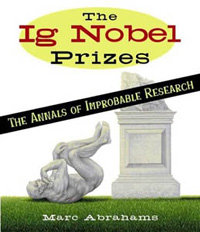 |
|
Ig Nobels Celebrate Weird
Science | |
Albert Einstein gets all the attention, but the great mind that
would-be inventors ultimately compare themselves to is Otto Rohwedder - at
least if they think they've invented the
greatest thing since sliced bread.
Up until 1928, the idea of selling pre-sliced bread was preposterous. After all, the bread
would quickly grow stale. Then Rohwedder came along.
After 13 years of tinkering, the inventor from Iowa introduced a
10-foot-long contraption that
sliced and stuffed loaves of bread into wax paper wrapping. The world
changed.
By 1933, 80 percent of the bread sold in the United States was
pre-sliced, leaving hungry Americans standing before their toasters
wondering, "What was the greatest thing before sliced bread?"
Last week, Interstate Bakeries, the makers of Wonder Bread, filed for
Chapter 11 bankruptcy protection. Call it Rohwedder's revenge. He sold the
patent for his bread-slicing machine shortly before Wonder Bread became a
uniquely American sensation.
I'm reminded of Rohwedder as Harvard University prepares to announce
the 2004 Ig Nobel Award winners - handed out since 1991 for research that
"cannot or should not be reproduced."
Last year's winners included the scientists who performed "An Analysis
of the Forces Required to Drag Sheep over Various Surfaces" and the
authors of the report "Politicians' Uniquely Simple Personalities."
The ceremony, which will be held this Thursday, has become an Ivy
League tradition, with Nobel Prize winners on hand to salute the winners.
And even though the Ig Nobel is not exactly a prestigious award, winners
travel from all over the world to collect their trophies.
"We're not insulted," said Jonathan Wyatt, a Scottish researcher at the
University of Glasgow who was honored with two other colleagues a few
years ago for a report titled "The Collapse of Toilets in Glasgow."
"Between us, we've published more than 70 research papers," he said.
"This is the only one that's given us any publicity at all."
If nothing else, the Ig Nobels demonstrates a form of courage, and you
need courage if you intend to be an innovator.
(Agencies) |
艾伯特·愛因斯坦是萬眾矚目的科學家,但是幾乎所有想要成為發明家的人都要與大師奧托·羅韋德爾比一下——起碼當他們認為自己發明了“有史以來最好的東西”時是這樣的。
1928年以前,出售切片面包的想法聽起來很荒謬,畢竟,這樣的面包很快就會變味。就在這個時候,羅韋德爾出現了。
經過了13年的修修補補,這位來自愛荷華州的發明家終于制成了一種10英尺長的精巧裝置。這種裝置能夠將成條的面包切成片并裝進蠟紙包裝袋里。世界從此發生了改變。
到了1933年,美國市場上出售的面包80%都是切片面包,惹得饑腸轆轆的美國人站在烤面包機前直納悶:“切片面包出現之前最偉大的事情是什么?”
上周,“奇跡面包”的制造商州際面包公司根據破產法第十一章提出了破產保護申請。就當這是羅韋德爾的“報應”吧。就在“奇跡面包”在美國引起獨一無二的轟動之前不久,他賣掉了切面包機的專利。
我之所以想起羅韋德爾,是因為哈佛大學正準備宣布2004年“搞笑諾貝爾獎”的得主。這個獎項從1991年起開始頒發,獎勵對象是那些“不能也不應再現”的研究。
去年的獲獎者包括“分析將一頭羊拉過不同平面時所需力量”的一批科學家,還有報告《政治家獨特的簡單人格》的(三位)作者。
將于本周四舉行的頒獎儀式已經成為常青藤聯盟的一項傳統,屆時諾貝爾獎得主將到場向獲獎者致敬。盡管“搞笑諾貝爾獎”并非一項聲望很高的大獎,但是獲獎者還是會從世界各地趕來領取他們的獎品。
“我們并沒有受到侮辱。”英國格拉斯哥大學的蘇格蘭科學家喬納森·懷亞特說。幾年前他和兩位同事共同獲得了“搞笑諾貝爾獎”,獲獎報告叫做《論格拉斯哥坐式馬桶的塌陷問題》。
他說:“我們合作研究發表的論文已有70多篇,而這是唯一一篇讓我們出了點名的。”
哪怕沒有別的貢獻,“搞笑諾貝爾獎”也弘揚了一種勇敢的行為。如果你想成為一名創造者,你需要的就是勇氣。
(中國日報網站譯) |
